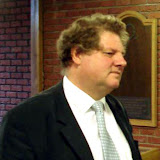Matthew tells us nothing of the childhood, or indeed the young manhood of Jesus. This is probably because there were no reliable stories to be told. But after the elegant interplay of dream and interpretation of the first two chapters, tales of a virgin and mystic men from the east, it is a little surprising to be plunged straight into a new narrative, heavily dependent on what we have already read in Mark, yet subtly tilted by Matthew to suit his own theological purpose. ‘In those days’, it begins, enigmatically. Once upon a time, in the good old days, John the Baptist came preaching in the wilderness saying ‘the kingdom of heaven is at hand’. We finger our way back to Mark’s account: that is not the way we remembered it. John preached repentance but not a kingdom. It was Jesus who preached the kingdom. Matthew connects John to Jesus more firmly than any other gospel writer. They preach the same basic message, they are both taken to be prophets, they are both opposed by the Jewish authorities, they are both killed and both have their bodies taken away and buried by their disciples. It is not until John is arrested that Jesus begins his ministry. John is introduced by nickname as a character who would have already been familiar to readers. Unlike Mark who sometimes calls him the one who came baptizing (and sometimes the baptizer), Matthew simply calls him the Baptist: and he is introduced primarily as one who preached, not one who baptized. Similarly, whereas for Mark it is the placing of John in the wilderness that matters, for Matthew preaching comes before wilderness and the wilderness is qualified as being of
So Matthew (and indeed Luke whose account is very similar here) immediately identifies the groups among the Jewish leadership who are the villains of the piece. The Sadducees had their strength in
They were self-designated sons of Abraham. Of course we have already been told, in the genealogy, that Jesus is the true son of Abraham. In sharp contrast to their claim to divine birthright, the Baptist identifies them as children of serpents. They are to be chopped down as useless branches fit only for firewood for the mighty one who will ignite the old timber when he comes in power. These drum rolls of judgment, never silenced for long in this gospel, introduce Jesus, the judge, to whom all authority will ultimately be given to clear the threshing floor.

No comments:
Post a Comment